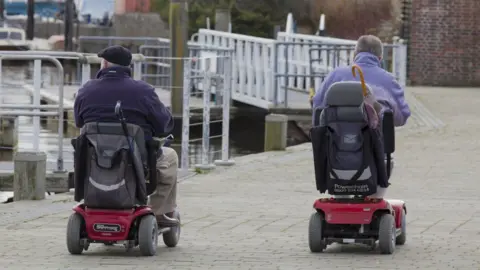Disabled pensioners freed from 'unnecessary' benefits checks
 Getty Images
Getty ImagesDisabled pensioners will no longer face "unnecessary" repeat assessments to continue receiving benefits, the work and pensions secretary has announced.
From spring, 270,000 people in Britain will not have personal independence payments (PIPs) regularly reviewed.
But a disability group said millions of younger people would "still be stuck in a failing system".
Amber Rudd also plans to increase a government target for getting a million more disabled people into work by 2027.
In a speech on Tuesday to the disability charity Scope, Ms Rudd said her blind father's experience influenced her plans to "level the terrain" for disabled people.
"My father became blind in 1981. For 36 years his blindness was a normal part of my family's life. Of my life," she said.
"Disabled pensioners have paid into our system for their whole lives and deserve the full support of the state when they need it most."
 PA
PAUnder the current system, disabled people's benefits under the PIP system require regular reviews, annually or every few years, with less severe or temporary disabilities checked more frequently.
Figures from October 2018 show there were approximately 28,000 pensioners claiming PIP in Scotland and 22,500 claims in Wales.
The remaining 220,000 recipients were based in England, with the largest number of claims - 43,000 - in the North West.
The result of the assessment determines the payments people receive to cope with the extra costs of living with a disability, such as mobility aids or adaptations in the home.
Pensioners will only face checks every 10 years and may be able to fill in a form rather than seeing an assessor in person under the new system.
In Northern Ireland, the Department for Communities has confirmed that 7,500 people will no longer have to be regularly reassessed following Ms Rudd's pledge.
'Ally of disabled people'
Disabled campaigners have criticised the PIP reviews for failing to take proper account of mental health conditions and for putting disabled people's independence at risk by cutting support.
Ms Rudd said that she wants to "significantly improve" the support for disabled people from the Department for Work and Pensions.
"The benefits system should be the ally of disabled people. It should protect them and ensure that the assistance the government provides arrives in the right place to those who need it most," she said.
She also announced a small scale trial to test the feasibility of bringing together the PIP assessments and Work Capability Assessments into one, in order to create a more "joined-up" approach.
The work capability assessment determines what benefits people receive if their disabilities or illnesses affect their ability to work.
Ms Rudd also said she plans to review the government's target to get one million more disabled people in work by 2027 to make it "more ambitious".
'Stuck in a failing system'
Genevieve Edwards, director of external affairs at the MS Society, said 83% of people with multiple sclerosis who appeal against their PIP assessments are successful - and that demonstrates "how bad the current assessment process is".
"While it's good news that older disabled people will no longer have to go through unnecessary and stressful reassessments, millions of others will still be stuck in a failing system," she said.
Ms Edwards said that merging the two forms of assessment without fixing their flaws would be like "harnessing two donkeys to a farm cart and expecting it to transform into a race chariot".
Mark Hodgkinson, chief executive at disability equality charity Scope, said he welcomed the change to PIP assessments but said a "more radical overhaul" to the benefits system for disabled people was needed.
"Disabled people also want to see action taken to scrap counterproductive benefit sanctions. They make it harder for disabled people to get into work."
